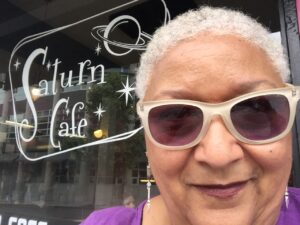Black Heritage in Horror: Interview with Jewelle Gomez


Jewelle Gomez, (Cabo Verdean/Wampanoag/Ioway; she/her). Her eight books include the first Black Lesbian vampire novel, THE GILDA STORIES, in print for 30 years, and recently optioned by Cheryl Dunye (“Lovecraft Country”) for a mini-series.
Her work appears in numerous anthologies including Dark Matter: A Century of Speculative Fiction from the African American Diaspora, and Luminescent Threads: Connections to Octavia Butler.
Her plays have been produced in San Francisco and in New York City.
Her new collection of poetry is Still Water.
TWITTER & Instagram: @VampyreVamp
What inspired you to start writing?
I think listening to the great storytelling of my grandmother and my father about their youth made me appreciate how stories can enrapture and teach us about life and can bring characters to life. Also I watched a lot of TV in the 1960s and was fascinated by stories from different historical time periods. Again characters I’d never meet were made real for me.
What was it about the horror genre that drew you to it?
When I wrote my novel, The Gilda Stories, I wasn’t specifically thinking of it as horror since it seems relatively mild in comparison to other writing like Stephen King, my first horror author. But I later realized the elements of horror: unexplained, terrifying circumstances really suited me. They helped create a heightened emotion and dramatic release, kind of like sex.
Do you make a conscious effort to include African diaspora characters and themes in your writing and if so, what do you want to portray?
African diasporic characters are the ground where I start; my stories almost always emerge from that experience. I do make an effort to include other ethnicities when I want to represent different aspects of the world as we see it.
What has writing horror taught you about the world and yourself?
I do believe that I can write anything I want and still be true to my social/political principles. We can create without creating victims. Having that conscious position from which I participate in life and write gives me a challenge to work harder. Too many writers are unconscious that they write from a privileged perspective; they are unimaginative in their narratives just as many are in their living day to day.
How have you seen the horror genre change over the years? And how do you think it will continue to evolve?
I think horror, like everything, moves in cycles. Sometimes psychological horror is more prevalent, sometimes physical horror, etc. I do think that technology, which has made gore more explicit, has influenced horror writing. More is written with higher shock value today I think, as if we have to compete with graphic visuals. We forget the imagination is the most exciting thing we can use to create horror.
How do you feel the Black community has been represented thus far in the genre and what hopes do you have for representation in the genre going forward?
Things have changed since Night of the Living Dead killed off Duane Jones; setting a precedent for black characters to never make it to the credits. When I started writing vampire fiction other black folx told me black lives were already horrifying enough w/out manufacturing ‘bogeymen.’ Since then other writers of color have begun to explore our history and culture to create horror that emerges from our reality. When I first published The Gilda Stories in 1991 I couldn’t find anything from writers of color in horror. Today I hope we keep expanding that pool and write about the history as well as contemporary narratives. Like all writing, in horror, we are expressing the human condition.
Who are some of your favorite Black characters in horror?
The Duane Jones character, ‘Ben’ in NOTLD mentioned above. Jacqueline, a creole slave who meets her vampire in Michelle Lane’s novel Invisible Chains; Taryn in Stephanie Andrea Allen’s collection How to Dispatch a Human, who does battle with an Alexa-like AI for the life of her child. Shuri, the young vampire in Octavia Butler’s Fledgeling. In Jordan Peele’s Get Out, I love the Lakeith Stanfield character: Andre/Logan.
Who are some African diaspora horror authors you recommend our audience check out?
Stephanie Andrea Allen, Tananarive Due, Michelle Lane, Colson Whitehead, Helen Oyeyemi, Justina Ireland, Linda Addison, Silvia Moreno Garcia.
What is one piece of advice you would give horror authors today?
I think reading more widely will give authors more ideas and impulses as well as broadening their field of characters, locations, and circumstances. I read The Search for Bridey Murphy in the 1950s about a white, American housewife who goes through past life regression and believes she was a 19th century Irish girl. The horror of that story stays w/me and informs some of the psychological terror I use in my writing. I think that’s because the subjects were so unlike me it created a frisson of untouched fear.
And to the Black writers out there who are just getting started, what advice would you give them?
Every culture and historical period carries the seed of some elemental tale that can be used to kickstart your imagination. When you begin w/the known (a dark alley, slavery, a hot beach, Aztec mythology) a horror story can rise out of it like smoke.



